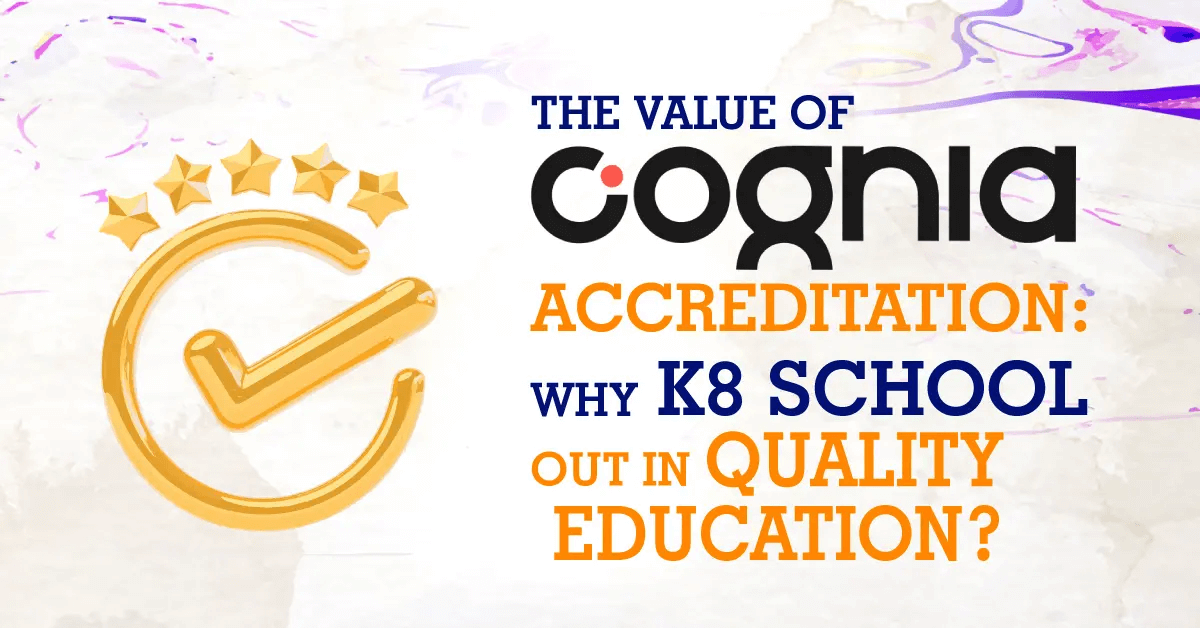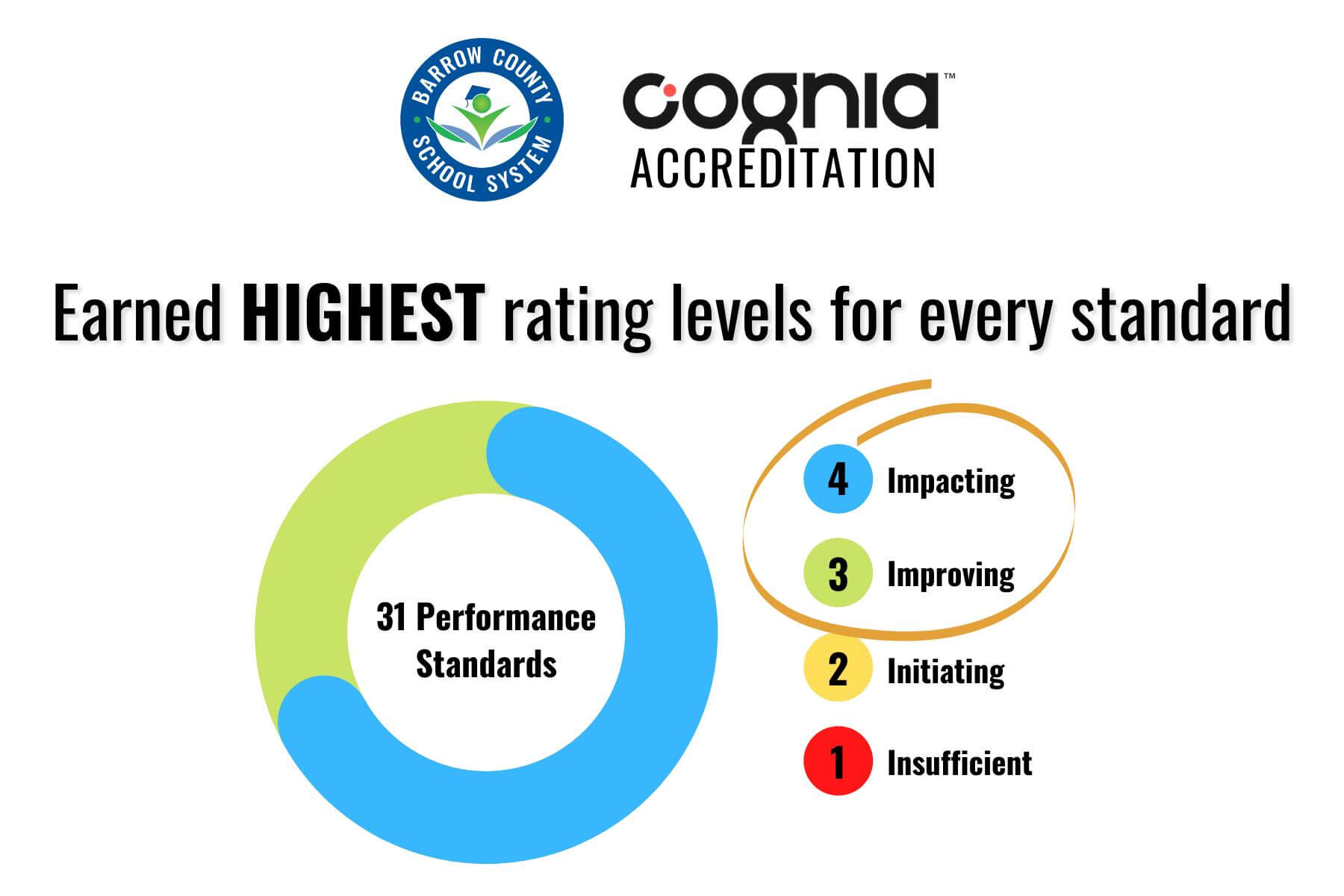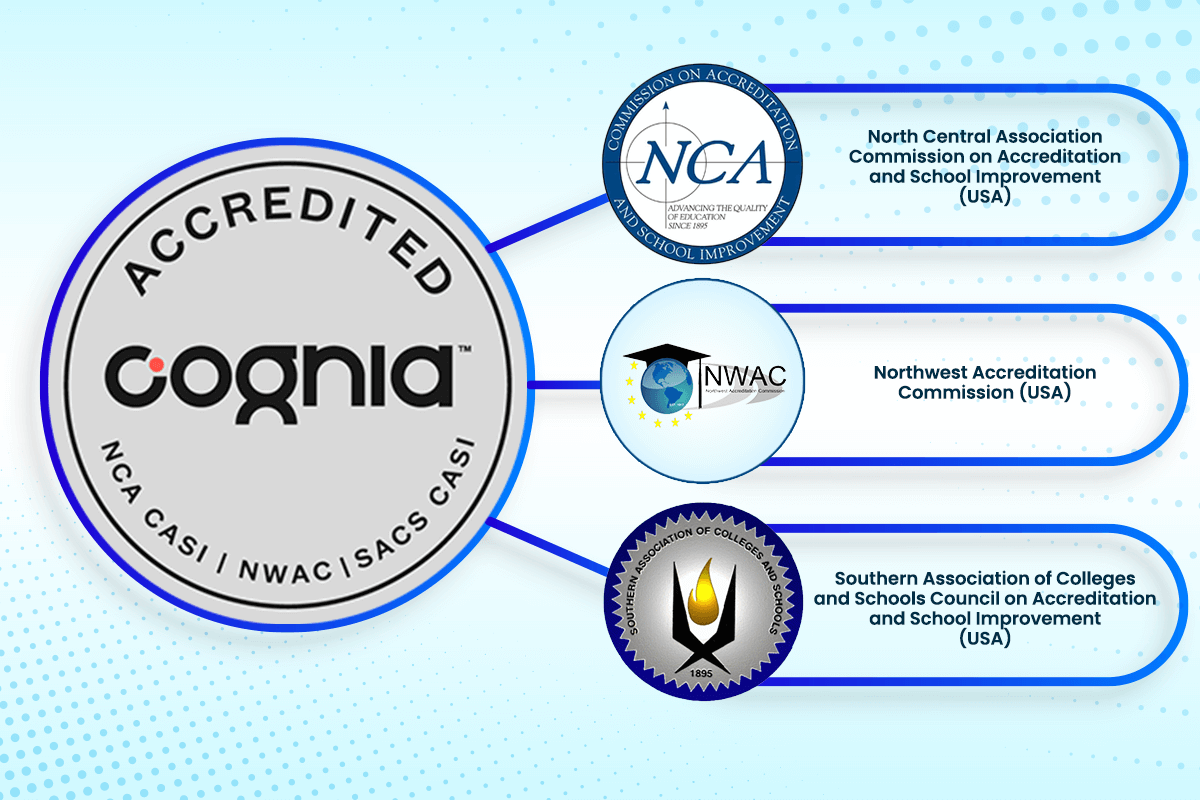The Importance of Accreditation in Educational Institutions: A Focus on Cognia
Accreditation plays a crucial role in the educational sector, significantly influencing the trust that parents and students place in schools. An accreditation certificate is often seen as a mark of quality and reliability, providing assurance that the institution meets specific standards of excellence. Among the various accrediting bodies, Cognia stands out as one of the most respected organizations, accrediting both elementary and secondary schools in the United States and internationally, including the top schools in Ajman.
What is Cognia?
Cognia is a non-profit, non-governmental organization dedicated to accrediting educational institutions. Formed in 2006, Cognia emerged from the merger of two regional US accrediting bodies: the Commission on Accreditation and School Improvement of the North Central Association of Colleges and Schools, and the Council on Accreditation and School Improvement of the Southern Association of Colleges and Schools. In 2012, the Northwest Accrediting Commission joined Cognia, further expanding its reach and influence. The organization took on its current name in 2019 after merging with Measured Progress in 2018.

Scope and Reach of Cognia
Cognia serves over 36,000 institutions globally, encompassing a combined enrollment of 25 million students and 1 million educators. Its standards and processes are designed to address the unique conditions of various types of schools, including charter schools, corporations, digital learning environments, early learning centers, educational service agencies, secondary schools, special schools, and entire school systems. This extensive reach allows Cognia to impact a diverse array of educational settings, ensuring that quality education is accessible to students from different backgrounds and learning environments.
The Accreditation Process
Accreditation with Cognia is a comprehensive process that occurs in several stages:
- Application: The institution submits an application to begin the accreditation process. This initial step involves providing detailed information about the school, its mission, and its educational programs.
- Candidacy Self-Assessment and Review by Cognia: The institution conducts a self-assessment, evaluating its current practices and identifying areas for improvement. Cognia then reviews this self-assessment to determine the institution’s readiness for the next steps.
- Accreditation Self-Assessment and Review by Cognia: A more in-depth self-assessment is conducted, focusing on specific standards and criteria set by Cognia. This is followed by a thorough review by Cognia’s experts, who visit the institution to observe its operations and gather additional evidence.
- Approval by the Cognia Global Commission: The commission, composed of educational professionals and experts, grants accreditation based on the reviews and assessments. This stage involves a rigorous evaluation of all collected evidence to ensure that the institution meets Cognia’s high standards.
- Follow-Up Monitoring of Progress: Continuous monitoring ensures the institution maintains and improves its standards. Accredited schools are required to submit regular reports and undergo periodic evaluations to demonstrate ongoing compliance and improvement.
The time required to achieve accreditation can vary depending on the specific circumstances of each institution. Factors such as the size of the school, the complexity of its programs, and its initial level of readiness can influence the duration of the accreditation process. Accredited school systems are re-evaluated every five years to ensure ongoing improvement in areas such as student learning, professional practice, stakeholder partnerships, and organizational effectiveness.

Evidence-Based Standards
Cognia’s accreditation process is based on rigorous, evidence-based standards and criteria. It involves a holistic examination of the entire organization, from policies and learning environments to cultural contexts. This thorough approach ensures that all aspects of the institution work harmoniously to meet the diverse needs of each student. The standards cover various domains, including:
– Leadership and Governance: Assessing the effectiveness of school leadership and governance structures in supporting student achievement and school improvement.
– Teaching and Learning: Evaluating the quality of instructional practices, curriculum design, and assessment methods to ensure they promote student engagement and success.
– Resource Management: Reviewing the allocation and use of resources, including facilities, technology, and financial assets, to support educational goals.
– Continuous Improvement: Monitoring the institution’s commitment to ongoing improvement through data-driven decision-making, professional development, and stakeholder engagement.
Recognition and Training
Cognia accreditation is recognized worldwide by universities, higher education institutions, state departments of education, and ministries of education. The organization’s rigorous standards and comprehensive evaluation process provide assurance that accredited schools meet high levels of quality and effectiveness. This recognition can enhance the reputation of accredited schools and open up opportunities for collaboration and partnerships with other educational institutions.
In addition to accreditation, Cognia offers training sessions for school boards and governing bodies to enhance their understanding of the continuous improvement process. These interactive sessions, lasting two to three hours, help board members and governing bodies explore their key roles and responsibilities in relation to Cognia’s accreditation standards. The training covers topics such as strategic planning, data analysis, and stakeholder communication, equipping participants with the knowledge and skills needed to support ongoing school improvement efforts.

Benefits for Students and Schools
Cognia accreditation is reserved for educational institutions that provide exceptional programs aimed at encouraging and enabling students to learn, participate, and grow. The benefits for students attending Cognia-accredited schools are numerous and significant:
- Easier Admission to Colleges Abroad: A high school diploma from a Cognia-accredited school can simplify the admission process to colleges in the U.S., Canada, the UK, and other countries. For instance, Aquinas International Academy (AIA), a Cognia-accredited school, offers a U.S. high school diploma that is widely recognized. This recognition can facilitate the transition to higher education institutions abroad, providing students with broader opportunities for academic and personal growth.
- Comprehensive and Deep Knowledge: Cognia-accredited schools can implement individualized learning tracks tailored to the interests, characteristics, and capabilities of each student. For example, students interested in exact sciences can study mathematics at an advanced level, akin to specialized mathematics schools. This personalized approach to education ensures that students receive a deep and comprehensive understanding of subjects that align with their passions and career aspirations.
- Increased Motivation and Interest in Learning: Cognia-accredited schools aim to provide a high level of education and motivation, helping students see the world as a vast and interesting place. This approach fosters a lifelong love for learning and exploration. By exposing students to a broad range of subjects and learning experiences, Cognia-accredited schools cultivate curiosity, critical thinking, and a desire to continuously seek knowledge and understanding.
- Enhanced Educational Experiences: Cognia-accredited schools often offer enriched educational experiences, such as advanced placement courses, extracurricular activities, and community service opportunities. These experiences help students develop well-rounded skills and competencies, preparing them for success in higher education and beyond.
- Global Competitiveness: Students from Cognia-accredited schools are often better prepared to compete in a globalized world. The rigorous academic standards and comprehensive education they receive equip them with the skills and knowledge needed to excel in diverse and competitive environments.
Conclusion
The accreditation process, particularly with organizations like Cognia, is vital for educational institutions striving to demonstrate their commitment to quality and continuous improvement. Cognia’s comprehensive standards and rigorous processes ensure that accredited schools provide top-tier education, ultimately benefiting students and enhancing their prospects for the future. As parents and students seek trustworthy and high-quality educational environments, the importance of accreditation becomes increasingly clear, making organizations like Cognia indispensable in the landscape of global education.
In conclusion, Cognia’s accreditation process is a cornerstone of quality assurance in education. It provides a framework for schools to evaluate their practices, identify areas for improvement, and demonstrate their commitment to excellence. For parents and students, the Cognia accreditation seal is a symbol of trust and confidence, representing an institution that prioritizes student learning and growth. As the educational landscape continues to evolve, the role of accrediting bodies like Cognia will remain essential in guiding schools toward higher standards and better outcomes for all students.

Biker, feminist, hiphop head, Saul Bass fan and recent OCAD grad. Making at the intersection of art and mathematics to create not just a logo, but a feeling. My opinions belong to nobody but myself.
